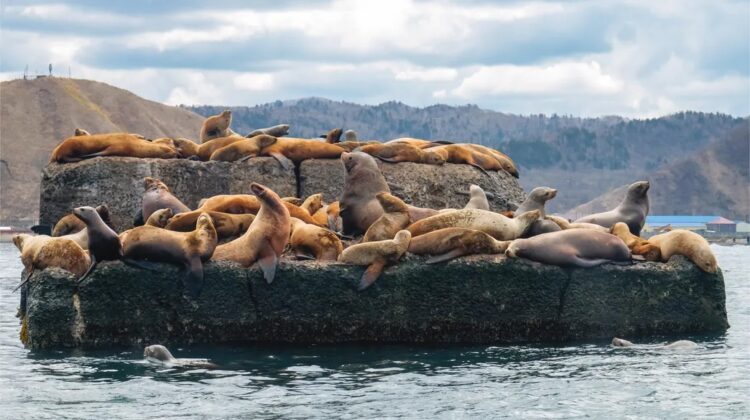
In many ways, sea lions are the canines of the sea. They hunt in packs, for example, and will go to great lengths for a scooby snack or two. And, like a pupper, they hit that sweet spot of intelligence: smart enough to pull off a spectacular food heist but not so clever that they flee the scene of the crime.
Just ask the workers at the Rant Point farm in British Columbia, near Tofino. A horde of nearly two dozen sea lions broke into the industrial salmon farm a few weeks ago, getting past the netting and electric fences designed to keep them away from the delicious bounty within, and began gorging themselves silly on fish.
They’ve remained ever since.
“They’re having an all-you-can-eat buffet right now,” said Bonny Glambeck, a member of the local environmental group Clayoquot Action.
Cermaq, based in Oslo, owns Rant Point, which can house up to 500,000 farmed salmon at any given time. It’s “the equivalent of putting a cattle feedlot in the middle of Banff National Park and then being surprised when the bears and wolves show up,” Glambeck told the Toronto Star, describing it as “the equivalent of putting a cattle feedlot in the middle of Banff National Park and then being surprised when the bears and wolves show up.”
The sea lions most likely got into the farm due to the start of harvesting season, Cermaq said in a statement shared with the Star. The fish are normally kept separate from the surrounding waters by a series of net fences, but the harvesting process creates “opportunities for access” that would not otherwise exist, according to the company.
While watching a bunch of sea lions live their best anarchist lives may be good for the soul, it may be bad for the sea lions. Cermaq is currently doing everything they can to get rid of the pinniped party animals because giant corporations don’t like having their product stolen from right under their noses.
“Attempts to deter the sea lions and remove them from the net pens have been ongoing in consultation with DFO [Fisheries and Oceans Canada] biologists,” DFO officials told CTV.
While there is a “strict requirement” that no sea lions be killed, the department claims that “passive deterrent efforts to remove them” – including attempts to scare them away with loud bangs – have so far “not been deterred.”
“I think the longer they stay, the more habituated they become to all the noises and other things,” Andrew Trites, director and professor at UBC’s Marine Mammal Research Unit, told CTV. “As a result, it won’t be effective.”
However, the longer the sea lions remain in the farm, the more concerned local conservationists become about their safety.
“We saw a sea lion jump over one of the fences and into a ‘bird net,’ which is a suspended net above the pens.” “He struggled for a long time to break free,” Glambeck told The Guardian. “With so many ropes and hoses around, we’re becoming increasingly concerned about entanglement.”
“They’re very intelligent animals,” she added, “and it’s so disheartening and heartbreaking to see these animals potentially harmed by this industry.”
For the time being, Rant Point is locked in a harvest battle between farm workers and sea lions.
“Several methods are being used to minimize any potential impacts, including the use of containment materials and active harvesting of targeted cages,” the Cermaq statement says, according to the Star. “By the third week of April, the site will be completely harvested.”
Until then, Trites believes the sea lions are unlikely to leave on their own.
“This is a time of year when males, in particular, bulk up,” he said. “They’re looking for more food, and these fish farms look like we just got to the deli.”

Leave a Reply